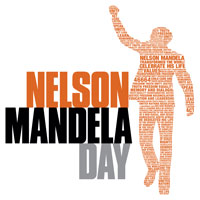Why we need more Mandela Days

What Mandela Day does is capitalise on a national reverence for an incredible South African to inspire people, particularly young people, in a cynical world where all too often extravagance equates to success.
Unfortunately, the concept of doing a community service for the satisfaction of helping others or trying to improve circumstances in a neighbourhood seems to be considered old-fashioned. Judging by the mess the world's economy is in today we didn't learn much from the Gordon Gekko era of the late '80s or the dot com bubble bursting a decade later.
It's naive to argue that we'd be better off if investment bankers had spent more time doing good deeds than mismanaging money, but the lemming-like greed that perpetuated the collapse of financial markets suggests a warped value set.
Step in the right direction
I'm not arguing that events such as Mandela Day are panacea, but surely anything we can do to get young people to think beyond themselves and their own needs must be a step in the right direction.
Our own experience is that the volunteer force, upon which we rely for events such as the annual Community Chest Carnival, is quite literally dying. Some people have been involved for 20 or 30 years, but when they pass on or retire, nobody's stepping up to take their place.
Some may argue that this is because young people are apathetic or more interested in social media than social welfare, but I don't believe that's true. As with many issues, there are probably multiple reasons.
I'd suggest that two of these are interlinked: volunteering as a way to make a difference in your neighbourhood or to assist those less fortunate has never occurred to most young people. That's because it hasn't been sufficiently presented as an option or personal value.
Quick fixes, next breaking news story
We live at a time where quick fixes and the next breaking news story are the order of the day. Haiti grabbed the world's attention for a while, but now, while many Haitians are still surrounded by the debris that was once their homes, we've moved on. Next it was New Zealand, then Japan and now the famine in East Africa.
Global fundraising appeals seem to suggest that all we need to do is make a donation and things will be fine. They won't and aren't, but we've already flicked to the next channel.
I know that this is simplistic and overstated. You can't expect people to drop everything to charge off and sort out problems half way around the world. Nor am I suggesting that money isn't vital in dealing with problems, whether they be natural or man-made, here or abroad. And I'm certainly not denigrating the efforts of organisations which raise funds to try and help.
What I am warning against is that, rather than making us more aware of massive human tragedy, the information age may be making us immune as we switch to the next big story.
Makes us less sensitive
There may be another consequence. Pictures of sprawling East African refugee camps or cities levelled by tsunamis make us less sensitive to very real issues on our doorstep. Suddenly, the woman and child begging at a suburban traffic light don't seem such a big deal.
That's the first part of the problem. The second - and the Community Chest is complicit - is that we don't enthuse young people about volunteering. Sure, we're on Facebook and Twitter, but we aren't providing widely visible examples of how you can make a difference in your neighbourhood and school. We present a youth award at our annual prize giving, but that's not really enough.
This isn't to say that there aren't some great initiatives involving young people; it's just that more are needed and they have to be engaging and effective.
This is why an event such as Mandela Day is important. Mandela is inspirational; he epitomises values such as empathy, tenacity, self-belief, sacrifice, selflessness and taking a stand for what is right, irrespective of the consequences.
Resonates with just about everyone
Importantly, he resonates with just about every part of South African society: to youngsters he's a hero, somehow he remains cool to jaded teenagers and to the rest of us he's a national treasure.
There will be people who think the 67 minutes campaign is gimmicky and contrived - so what? If it helps to inculcate some of Mandela's values in young people, empowering them to do something constructive for themselves, their communities, their fellow South Africans and their country for no reward, other than the fact that it improves people's lives, it has succeeded.
For more:
- Bizcommunity Opinion: Brand-building in the time of conspicuous conservation by Mike Freedman
- Bizcommunity Opinion: Brand charity (false ideologies not sold separately) by Matt Rose





























